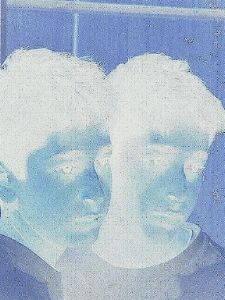The Self And The
Formation Of The
Unconscious
Decoding Of
The Religion Of
Ancient Egypt
Read Some Extracts
Unlike the Freudian conception that deals with the psychological apparatus as a thing, the author gives an important place to the will without however denying the crucial role of the superego and the id. If man is a wolf to his fellow man, as Freud said, the will must play a role in the psychological dynamics and the management of personal interests must be examined more closely. In the first part of the book, the author does a quick review of the Freudian logic and he introduces the reader to the importance of the environment which ultimately forms a coherent unit with which man must deal, environment to which are confronted the personal interests. The self advances in both selfish way and respect of others’ rights way in order to satisfy itself and to ensure its survival among others. Existing in the midst of a general order that is reflected in the fauna, the flora and others’ rights, man is torn between what favors him to the detriment of others and the respect of this order that the author names “coherence”.
 If man seeks pleasure and avoids displeasure, interests are always present and wait for his management which sometimes leads to delay pleasure or to refuse it. Thus, there are, in the self, two tendencies which, by their antagonism ensure its development. The first one is the tendency to respect others by not encroaching upon their rights and the second one consolidates the self with all that is available; the latter will allow not to respect others’ rights just to achieve a rapid development of the self. The tendency that respects the environment and refuses to deal with selfishness is the coherent-impetus; the one that cares about the self and wants to consolidate it even at the expense of others’ rights is the impetus-toward-the-ego. Man chooses the proposal sponsored by one of these two tendencies of the self and he favors it and disadvantages the other. By doing so, he promotes the inner awakening to oneself and personal interests at the expense of the inner awakening to coherence and others’ interests or he promotes the inner awakening to coherence and others’ interests and restructures the inner awakening to oneself and personal interests in order to take greater account of the presence of others.
If man seeks pleasure and avoids displeasure, interests are always present and wait for his management which sometimes leads to delay pleasure or to refuse it. Thus, there are, in the self, two tendencies which, by their antagonism ensure its development. The first one is the tendency to respect others by not encroaching upon their rights and the second one consolidates the self with all that is available; the latter will allow not to respect others’ rights just to achieve a rapid development of the self. The tendency that respects the environment and refuses to deal with selfishness is the coherent-impetus; the one that cares about the self and wants to consolidate it even at the expense of others’ rights is the impetus-toward-the-ego. Man chooses the proposal sponsored by one of these two tendencies of the self and he favors it and disadvantages the other. By doing so, he promotes the inner awakening to oneself and personal interests at the expense of the inner awakening to coherence and others’ interests or he promotes the inner awakening to coherence and others’ interests and restructures the inner awakening to oneself and personal interests in order to take greater account of the presence of others.
The dynamics of these two awakenings is that of consciousness and their modification leads hence a change in the consciousness and the psychological reality.
The self passes the temporal needs of man, it is only interested in growing, reacting to the coherence that influences its growth. Promoting a tendency of self instead of the other, man acts as an authority because he is capable of modifying his psyche; he acts as the authority self-individual.
 This psychological view overlooks the Freudian dynamics: the authority self-individual acts by using the will. To choose the camp of the impetus-toward-the-ego or that of the coherent-impetus, this authority must first decode the timelessness of the tendencies of the self. Then the self-individual must choose and take action to leave room to his choice in his psychological reality. These steps of the intervention of the authority self-individual constitute a management whose result will modify the consciousness and channel the activity of the self.
This psychological view overlooks the Freudian dynamics: the authority self-individual acts by using the will. To choose the camp of the impetus-toward-the-ego or that of the coherent-impetus, this authority must first decode the timelessness of the tendencies of the self. Then the self-individual must choose and take action to leave room to his choice in his psychological reality. These steps of the intervention of the authority self-individual constitute a management whose result will modify the consciousness and channel the activity of the self.
But choosing is not easy for the self-individual. He must live the conflict and accept the consequences of his choice, which can sometimes push him to take refuge in resignation. To escape the conflict between the coherent-impetus and the impetus-toward-the-ego, he must neutralize the conflict of interests. To do so while being fond of his selfish desires, he must destroy any evidence of lack of respect to others. He will therefore develop new dynamics between the inner awakening to oneself and personal interests and the inner awakening to coherence and others’ interests. The purpose of these new dynamics is to not allow selfish desires, especially Oedipal desires, to emerge. He will love (or at least respect) the hated parent and keep a distance between him and the coveted one. To maintain this state of things, he will continuously feed a force of censorship that is the superego and whose role is to maintain these forced love and respect in order not to leave the oedipal desires emerge. Thus the superego is not an authority, despite its presence at the forefront of the psychological dynamics. Its role is to serve the impetus-toward-the-ego and the resigning authority self-individual by keeping between the awakenings of the consciousness an activity capable of excluding all possibility of expression of Oedipal desires …
1 – First solution: choosing the side of the coherent-impetus with rejection of the pressure exerted by the impetus-toward-the-ego. The self-individual evaluates the situation and chooses the proposition of the coherent-impetus. He makes his choice, dominates his impetus-toward-the-ego and acts consequently by considering others’ respect as a priority. In this case, he reacts toward his impetus-toward-the-ego and his coherent-impetus; he has an ideal according to which he exerts his will.
2 – Second solution: the choice of the side of the impetus-toward-the-ego with rejection of the coherent-impetus. The self-individual favors the impetus-toward-the-ego with full knowledge of the facts. He chooses, silences the coherent-impetus and acts accordingly, committing voluntarily the selfish act which interests him, putting the respect of others and harmony in the background. In this situation also, man reacts toward his impetus-toward-the-ego and his coherent-impetus; he exerts his will. To be able to choose the camp of the impetus-toward-the-ego or that of the coherent-impetus, he had to decode them in temporal language. To the decoding of the impetus-toward-the-ego, the coherent-impetus reacts. This procedure of translation of the timeless desires into temporal desires is made at the level of the management of decoding and implication from which the self-individual manages the situation and acts actively, choosing his impetus-toward-the-ego without letting himself invaded by it. If the latter progresses, conflict after conflict, and decreases the clearness of the inner awakening whose dynamics tend to be dominated by the inner awakening to personal interests and the inner awakening to oneself, yet the self-individual remains able to exert his will.
If he takes the path of the coherent-impetus and retracts on the way or later, and if he chooses the path of the impetus-toward-the-ego and corrects himself on the way or later; he changes his path. He does it by weakness or by new conviction. However, in both cases, in spite of possible weakness and doubt, he remains master of the situation because of his prerogative to manage, decide and change camp at will, expressing himself through his management of decoding and implication.
Theoretically, these are the two possible solutions of the conflict. However, there is another outcome, the one of letting oneself be more or less influenced by the deep-self with the aim to avoid the conflict. Then the self-individual does not fulfill any more his role of referee but he becomes guided by the invading deep-self. The coherent-impetus whose interest is the respect of coherence cannot invade the self-individual and respects the natural role of this authority as a leader. The problem comes from the other camp. Leaning on the side of the centripetal desire to satisfy only the self that is the basis of selfishness, the self-individual may lose the ability to remain at an equal distance from the two impetuses. Unable to modify anything in the deep-self, he will change some parameters related to his management of decoding and implication and he will benefit from the invasion done by the deep-self. However, would we say, why let himself be invaded by the impetus-toward-the-ego and the centripetal desire to satisfy only the self if he can simply choose the impetus-toward-the-ego? Choosing is taking the responsibility of the decision and bearing the burden of the management that will modify the inner awakening. Choosing is getting involved in the potentiality of a future conflict …
